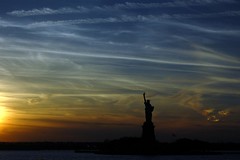 Image by jordi.martorell via Flickr
Image by jordi.martorell via FlickrBy Scott James
John Newman fondly recalled the eight years he taught first and second grades in Vallejo public schools — he felt appreciated, and was once named “Teacher of the Year.” It was the 1990s, before he got sick and was told to leave the United States.
“I was accepted by co-workers, neighbors and employers,” Mr. Newman said. “But I was not welcome by the government.”
Mr. Newman, a Canadian, contracted H.I.V., which causes AIDS and nearly killed him. Breakthrough drugs brought back his health. Then he discovered that a law many considered cruel required him to leave his home. Sadly, he returned to Canada.
Now the stories of people like Mr. Newman are becoming public. Experts say tens of thousands shared similarly interrupted lives thanks to a 22-year United States ban on allowing foreigners with H.I.V. to live in this country.
President Obama described the ban as “rooted in fear rather than fact.” It became a dead letter in January.
“The people affected by this have lived in the shadows,” said Steve Ralls, a spokesman for Immigration Equality, a nonprofit organization working to end immigration restraints based on H.I.V. status and sexual orientation.
Mr. Ralls said the phones at his group’s legal aid headquarters in New York “started ringing off the hook and they have not stopped” since the ban was lifted. He said people were being reunited with lives — and in some cases spouses and families — they had been forced to leave behind.
The ban was imposed in 1987 when H.I.V.-positive foreigners were added to a list of inadmissible undesirables that included prostitutes and felons, said Christian Schmidt, a San Francisco immigration lawyer.
“They didn’t let you in,” Mr. Schmidt said. Those already here were tested. If results were positive, they had to leave.
The ban grouped H.I.V. — which is infectious and transmitted in blood and through sexual contact — with tuberculosis, a contagious airborne disease.
Critics said that by incorrectly inferring that H.I.V. was spread by casual contact, and equating the sick with criminals, the ban demonized those infected. “It’s really impossible to underestimate the stigma caused by this law,” Mr. Ralls said.
The ban “set a very bad precedent,” he said. “It undermined H.I.V. awareness and testing.”
Foreigners avoided testing, which Mr. Ralls said might have worsened the spread of AIDS.
The United States was the only industrialized country with such a policy; the handful of others included Iran, Iraq and Syria.
The policy took effect in the Reagan administration. Former Secretary of State George P. Shultz declined to comment when contacted recently.
Efforts to lift the ban were blocked by a 1993 Congressional amendment introduced by Senator Jesse Helms, Republican of North Carolina. Those who fought the law say Mr. Helms, who died in 2008, perpetuated decades of discrimination.
But just as the ban has disappeared, the curators of Mr. Helms’s legacy are trying to touch up the relevant history. Some want him seen as a savior to those with AIDS and a defender of gay rights.
Despite Mr. Helms’s storied opposition to “a homosexual lifestyle,” the Jesse Helms Center in Wingate, N.C., is challenging the idea that he was a “homophobe” or obstructive in the AIDS fight.
According to the center’s Web site, “It was Senator Helms who worked most tirelessly to protect the very principles of freedom that homosexuals are denied in many other nations.”
John Dodd, president of the Jesse Helms Center Foundation, recently disputed an editorial in the British newspaper The Guardian that vilified Mr. Helms for his role in the ban. Mr. Dodd argued that “two million Africans were alive” because of the senator’s work fighting H.I.V.
Assemblyman Tom Ammiano of San Francisco, whose partner Tim Curbo died from AIDS, said the Helms Center sought to sanitize the record. “It’s spitting on the graves of all the people who suffered,” Mr. Ammiano said, adding, “He was truly evil and very cavalier about it. He should be in the hall of shame.”
Meanwhile, Mr. Newman is making plans to return to the United States. He e-mailed this week that he was in Kino Bay, Mexico, where “the sky is blue and the sun is hot.” Next week he plans to get behind the wheel of an R.V. and head north, feeling welcome for the first time in years.
Scott James is an Emmy-winning television journalist and novelist who lives in San Francisco.

![Reblog this post [with Zemanta]](http://img.zemanta.com/reblog_e.png?x-id=c0d70bf4-8b0a-4342-bb33-c38aba4a857f)






 Join our page
Join our page


0 comments:
Post a Comment